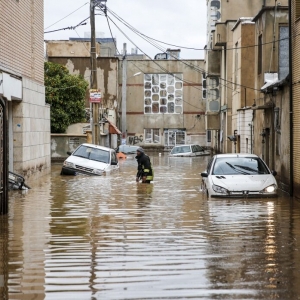The Stream, May 3: UN Delegates Negotiate Global PFAS Ban; China Requests PFOS Exemption
The Global Rundown
China seeks an exemption as the United Nations moves to ban some PFAS compounds. The first major rainfall in a year arrives along parts of Australia’s parched Darling River. India orders the evacuation of 1.2 million people ahead of a fast-moving cyclone. Volunteers step up to help victims of Iran’s recent floods. NASA data shows human activity was influencing global drought risk 100 years ago.
“We are here with fire fighters, fire safety experts and indigenous experts to call for a global ban on PFOA. This is a dispersive use that is harming the health of firefighters directly and also contaminating the drinking water of millions of people around the world.” –Pamela Miller, co-chair of activist group IPEN, in reference to negotiations led by the United Nations Environmental Program on banning some per- and polyfluoroalkyl substances (PFAS). More than 180 countries are working toward a global ban, but China has called for the ongoing use of PFOS in fire-fighting foam. Reuters
Latest WaterNews from Circle of Blue
Capital Flight? Indonesia Leader Suggests Moving Government Out of Sinking Jakarta — Unsustainable groundwater use is one factor that could prompt a political and urban restructuring.
HotSpots H2O: Worsening Drought and Conflict Loom in Southeast Asia — More than 66 million Southeast Asians had their lives disrupted by drought in the past three decades. Unless governments take decisive action soon, the future could be worse, a new report warns.
By The Numbers
70 percent Amount of its annual rainfall that one Iranian city received in a single day earlier this year. After years of drought, unprecedented flooding has disrupted 26 of the country’s 31 provinces in recent months. The government has been criticized for its reaction to the crisis, but many civilians have stepped up to help those devastated by the floods. PRI
28mm Rainfall recorded in this week in Menindee, Australia, the site of three massive fish kills since the beginning of 2019. The rainfall represents the first substantial precipitation in the area in over a year. The Guardian
Science, Studies, and Reports
A study by NASA’s Goddard Institute for Space Studies (GISS) claims human activities have worsened drought risk since the early 20th century. Researchers analyzed tree-ring data, soil moisture measurements, and drought records, and found that the actual data matches scientific predictions about the impact of human-generated greenhouse gas emissions on the global climate. Science Daily
On the Radar
A strong cyclone is moving toward Odisha, India, prompting the evacuation of roughly 1.2 million people living in low-lying areas. The cyclone is expected to make landfall on Friday. Reuters
Kayla Ritter is a recent graduate of Michigan State University, where she studied International Relations and Teaching English to Speakers of Other Languages. She is currently based in Manton, Michigan. Kayla enjoys running, writing, and traveling. Contact Kayla Ritter








Leave a Reply
Want to join the discussion?Feel free to contribute!